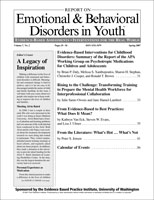Maternal Depression and Barriers to Mental Health Services
Author: Mary A. Cavaleri, Ph.D., L.C.S.W..; Mary M. McKay, Ph.D., L.C.S.W..
Source: Volume 06, Number 02, Spring 2006 , pp.32-35(4)

< previous article |next article > |return to table of contents
Abstract:
Practitioners who work with children and adolescents endeavor to identify and, when possible, amend threats that jeopardize the child’s well-being. Yet one major risk factorthat is often overlooked is maternal depression. This oversight is of great concern, considering that an extensive body of research indicates that children are adversely affected when their mother is depressed. For instance, infants of mothers who suffer from depressive disorders evidence neurochemical and physiological differences, lag behind developmentally, and exhibit greater behavioral difficulties, eating problems, and sleeping difficulties than children of mothers who are not ill. Moreover, older children and adolescents of depressed mothers fare no better, evidencing higher rates of mental illness and greater disturbances in their academic performance,behavior, and social interactions than children whose mothers are not depressed.Keywords:
Affiliations:
1: Department of Psychiatry, Mount Sinai School of Medicine; 2: Department of Psychiatry, Mount Sinai School of Medicine.